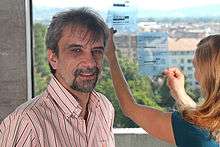Markus Rüegg
Markus Rüegg is a Swiss neurobiologist and professor at the Biozentrum of the University of Basel.
Markus Rüegg | |
|---|---|
 Markus Rüegg (2011) | |
| Nationality | Swiss |
| Awards | 2000 Robert Bing Prize |
| Scientific career | |
| Fields | Neurobiologie |
| Institutions | University of Zürich, Stanford University, Biozentrum University of Basel |
Life
Markus Rüegg studied biochemistry at the University of Zurich and graduated with a PhD in the field of Neurobiology. In 1989 he went as a postdoctoral fellow to conduct research at the Department of Neurobiology at Stanford University School of Medicine.[1] In 1992 he was appointed as Assistant Professor to the Biozentrum, University of Basel. Since 1998 he is a Professor of Neurobiology and teaches and conducts research at the Biozentrum of the University of Basel.[2]
Work
Rüegg studies the molecular processes important for the formation and function of the neuromuscular system. A major part of his investigations involve the characterization of the extracellular and intracellular signaling pathways. Markus Rüegg has successfully developed new approaches for the therapy of merosin-deficient congenital muscular dystrophy, a serious genetic disease.[3] In addition, his research group has recently demonstrated that the multi-protein complex mTORC1 is an important regulator of muscle growth and autophagy, a cellular self-cleaning process.[4] These findings may help to counteract pathological muscle degradation and to develop new therapy strategies.
Awards and honors
- 2000 Robert Bing Prize of the Swiss Academy of Medical Sciences[5]
- 2013 Chairperson, Scientific Advisory Board of the “ Swiss Foundation for Research on Muscle Diseases ” (SSEM)
- 2000 - 2007 Council Member of the der Swiss Society for Neuroscience[6]
- 2014 Member of the Research Committee of the European Neuromuscular Centre (ENMC)[7]
Notable publications
Full publication list[8]
- Ruegg, M.A., Tsim, K.W., Horton, S.E., Kröger, S., Escher, G., Gensch, E.M., and McMahan, U.J. (1992). The agrin gene codes for a family of basal lamina proteins that differ in function and distribution. Neuron 8, 691-699. PMID 1314621
- Moll, J., Barzaghi, P., Lin, S., Bezakova, G., Lochmuller, H., Engvall, E., Muller, U., and Ruegg, M.A. (2001). An agrin minigene rescues dystrophic symptoms in a mouse model for congenital muscular dystrophy. Nature 413, 302-307. PMID 11565031
- Bentzinger, C.F., Romanino, K., Cloetta, D., Lin, S., Mascarenhas, J.B., Oliveri, F., Xia, J., Casanova, E., Costa, C.F., Brink, M., Zorzato, F., Hall, M.N., and Rüegg, M.A. (2008). Skeletal muscle-specific ablation of raptor, but not of rictor, causes metabolic changes and results in muscle dystrophy. Cell Metab 8, 411-424. PMID 19046572
- Meinen, S., Lin, S., Thurnherr, R., Erb, M., Meier, T., and Ruegg, M.A. (2011). Apoptosis inhibitors and mini-agrin have additive benefits in congenital muscular dystrophy mice. EMBO Mol Med 3, 465-479. PMID 21674808
- Castets, P., Lin, S., Rion, N., Di Fulvio, S., Romanino, K., Guridi, M., Frank, S., Tintignac, L.A., Sinnreich, M., and Ruegg, M.A. (2013). Sustained Activation of mTORC1 in Skeletal Muscle Inhibits Constitutive and Starvation-Induced Autophagy and Causes a Severe, Late-Onset Myopathy. Cell Metab 17, 731-744. PMID 23602450
External links
References
- Former lab member Archived 2014-07-14 at the Wayback Machine stanford.com. Retrieved 2014-07-09.
- Curriculum Vitae biozentrum.ch. Retrieved 2014-07-09.
- Restoration of autophagy as a new strategy for the treatment of congenital muscular dystrophies fsrmm.ch. Retrieved 2014-07-09.
- Uncleaned Cells Mean Weak Muscles innovations-report.com. Retrieved 2014-09-07.
- Synopsis der PreisträgerInnen des Robert-Bing-Preises Archived 2014-07-14 at the Wayback Machine samw.ch. Retrieved 2014-07-14.
- Wissenschaftlicher Beirat fsrmm.ch. Retrieved 2014-07-14.
- ENMC Member and Partner Organisations Archived 2014-07-14 at the Wayback Machine enmc.org. Retrieved 2014-07-09.
- "Publication list". Biozentrum.unibas.ch. Retrieved 2014-07-09.